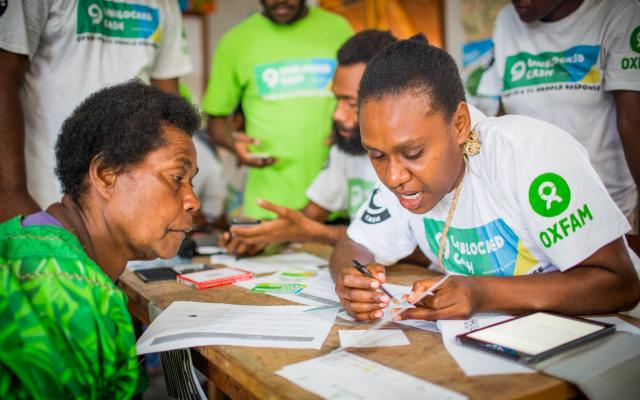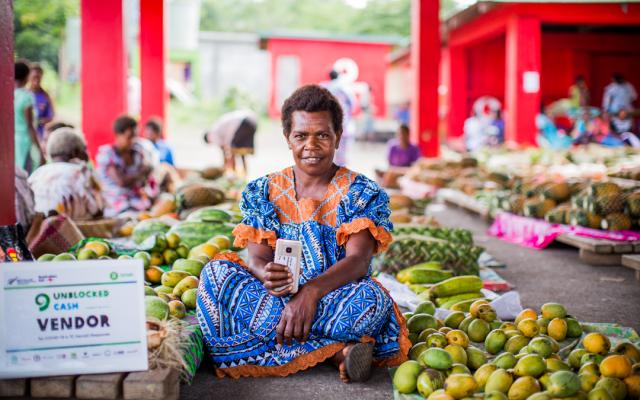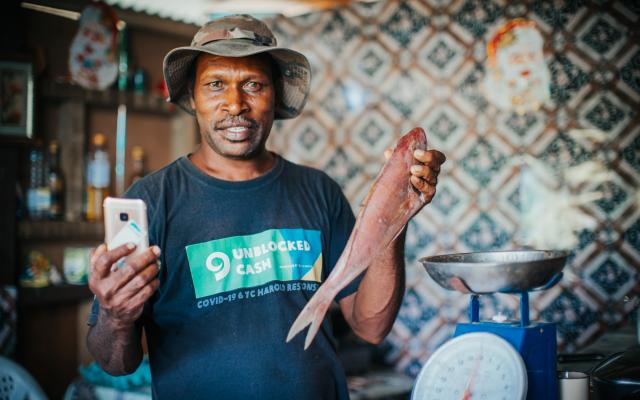
Market vendors from Lenakel town, Tanna island, Vanuatu. They are ones of few hundreds vendors participating in the UnBlocked Cash program delivering assistance and economic recovery in response to Covid-19 and Tropical Cyclone Harold that battered the islands in 2020. Photo: Arlene Bax/Oxfam.
The world’s population requiring humanitarian assistance has been growing in recent years due to climate-caused disasters. The socio-economic impacts of the COVID-19 pandemic have only enlarged the burden on the humanitarian community, who now needs to assist more people with the same or fewer resources.
Oxfam’s UnBlocked Cash project (UBC) is a blockchain-powered cash transfer solution that is set to tackle this challenge. It is saving costs of distributing aid, reducing delivery times, and bringing more transparency and accountability in the process. It offers an opportunity to improve how aid is delivered without compromising the dignity of beneficiaries.
Accelerating digital cash assistance with blockchain
The UnBlocked Cash solution consists of three key elements: 1) e-voucher “tap-and-pay” cards provided to beneficiary households which they can use to purchase goods, 2) smartphones with a pre-installed app through which vendors receive payments, and 3) a single-payment online platform where NGOs like Oxfam can disburse funds and monitor transactions remotely and in real-time. A dedicated Oxfam team is providing support to beneficiaries and vendors to accommodate the smooth user experience and training in basic digital skills.
$2M USD in aid distributed digitally
+15 partners in the response consortium
35,000 beneficiaries assisted in the Pacific
Delivery time reduced by 96%
Satisfaction rates of users 96%
Distribution costs lowered by 75%
Scaling across the Pacific region and beyond
The project originated in 2019 in Vanuatu, where the severity of Tropical Cyclone Harold and COVID-19 restrictions had resulted in a significant reduction in income and livelihoods, particularly amongst households with pre-existing vulnerabilities. Oxfam, in partnership with Australian fintech Sempo and blockchain company ConsenSys first piloted the project with the active participation of 198 beneficiaries and 33 vendors across 2 communities.
After the successful reception of the pilot the project was scaled up and is now being implemented across Vanuatu, to distribute cash and voucher assistance to over 35,000 beneficiaries. The project has harnessed the capacities of more than 15 partners across government, private sector, and local and international NGOs. Delivering together in the Pacific’s first consortium-led response, Oxfam is providing technical design, operational leadership, and strategic direction for the initiative.


Accessing remote communities in Papua New Guinea
Drawing from the learning and experience in Vanuatu, we continued to explore ways to access remote communities and deliver much-needed assistance to people affected by natural disasters. We deployed a similar program in Papua New Guinea, where heavy rains in early April 2020 caused floods and landslides in several highland provinces which affected about 700 people and damaged and destroyed their houses and gardens.
The project has attracted interest in other countries. It has been piloted in Venezuela and will also be deployed in the Solomon Islands in 2021, with the Pacific region leading other pilot locations across Oxfam’s global confederation.
Greater transparency of aid funds
The UBC project is based on the innovative use of a digital version of the local currencies in the form of collateralized blockchain tokens. This technology has introduced the concept of digital financial inclusion in Vanuatu, where the majority of the population are unable to access banking services.
The use of stable digital currencies has also introduced the potential for institutional donors to fund and track funds across multi-country programs, with just a single contribution and access to a central analytics dashboard. The platform has the potential to flexibly integrate direct cash distribution and individual donations, allowing for a more transparent, direct humanitarian assistance.
A technology that empowers people
Cash assistance has long been praised for its efficiency and more dignified means of delivering aid. It is also one of Oxfam’s strategic goals to allow people in need to decide about their future, including the purchases they make. Thanks to blockchain technology we can give people freedom of choice while ensuring their privacy and protecting their data and increasing monitoring capabilities on spending patterns.
The UnBlocked Cash project has been designed as a user-centered solution empowering the beneficiary communities and local shops in their economic recovery. This payment delivery system is enabled by the participation of community-level vendors who play a direct role in micro-economic recovery and development. The unique feature of the Vanuatu program design is a vendor-to-vendor cash-out, where vendors can exchange their digital tokens into a local fiat currency between themselves, or purchase goods from each other without any intermediaries. This offers greater financial liquidity and ease of exchange that is essential for economic development.
Oxfam uses blockchain technology to mitigate the risks of gender-based violence that may occur as a result of cash and voucher assistance. The use of electronic vouchers via the blockchain system created more security and comfort for women as they do not have to carry or keep hard cash. The project aims to strengthen women’s economic empowerment by targeting women as primary recipients of cash assistance with a total of 54% female beneficiaries in the programme. It has given many female market vendors a wonderful opportunity to increase sales and become more in charge of the income that they bring into the household. Many have benefited from an increase in digital literacy, having learned how to use and navigate a smartphone for the first time.
Beyond a humanitarian support mechanism, the UnBlocked Cash solution is generating a market stimulus for local businesses and recovering economies. In a country where only 37% of the population has access to formal banking systems, most local businesspeople and small vendors have never processed electronic payments. Now they are able to receive a payment into their digital wallets with just a tap of the card, through more secure and easy transactions. The project is inclusive of street and market vendors from the informal economy, and vendors without access to electricity grid or internet connection. They are now at the centre of a technology and banking revolution.


Oxfam’s UnBlocked Cash project won the European Union 2020 Horizon Prize for Blockchain for Social Good in Aid category, which will support further scaling of the project beyond the Pacific region. It has also been selected the winner of the 2020 World Summit Awards in the Inclusion & Empowerment category. The project has been recognised from among +350 nominated projects as a technological solution with high social impact on promoting sustained, inclusive and sustainable economic growth, full and productive employment and decent work for all (SDG 8) and reducing inequalities (SDG 10).
Project donors

Project partners

All photos: Arlene Bax/Oxfam